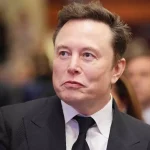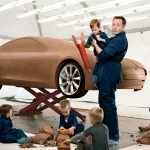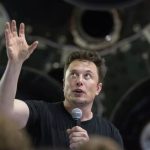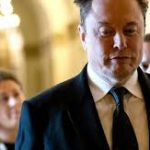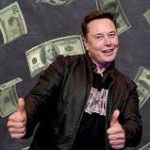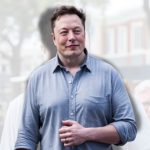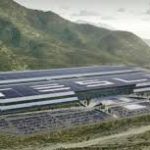Elon Musk’s Baby Boom: Saving Humanity or Sci-Fi Stunt? Buckle Up!
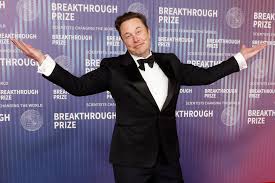
Elon Musk’s Baby Boom: Saving Humanity or Sci-Fi Stunt? Buckle Up!
Introduction: Elon Musk, the billionaire entrepreneur known for his ambitious ventures like Tesla, SpaceX, and Neuralink, has been making waves recently—not just in the tech and space industries, but in the world of parenting as well. Musk, who has fathered 14 children, has sparked a wave of speculation about the reasons behind his growing family and what it might mean for humanity’s future. Is Musk’s baby boom a deliberate plan to save humanity from extinction, or is it simply a sci-fi-inspired stunt? In this article, we dive into Musk’s personal life, exploring his motivations behind his expanding family, the possible implications of his approach to procreation, and the broader questions about society, technology, and the future that his actions raise.
Musk’s Motivation: A Future Beyond Earth Elon Musk’s ambitions are famously grandiose—his goal to make humanity a multi-planetary species through SpaceX and his dream of colonizing Mars have been well documented. But how does his extensive family fit into this larger vision? Musk has been outspoken about the potential dangers facing humanity, including overpopulation, resource depletion, and even existential threats like climate change and artificial intelligence. His belief in the need for humans to expand beyond Earth seems to tie directly into his growing family. By ensuring a larger population, particularly with his own offspring, Musk may be looking to create a genetic foundation for future generations that could thrive on Mars or other planets.
In interviews, Musk has hinted at the importance of “ensuring the continuation of humanity.” As Earth faces various existential challenges, Musk believes that having more children will help ensure the survival of the human race, especially if humanity is to venture beyond Earth and establish colonies on other planets. His large family may reflect his desire to create a backup plan for humanity’s future—if Earth becomes uninhabitable due to climate change, war, or another disaster, a thriving, genetically diverse population would be essential for establishing life elsewhere.
Musk’s personal beliefs about the future of humanity are intertwined with his approach to family life. His children, whether they follow in his footsteps or not, will represent a new generation that may one day help continue his work in space exploration and perhaps even shape the future of human life on Mars. By bringing so many children into the world, Musk is symbolically investing in the continuation of human civilization—whether on Earth or beyond.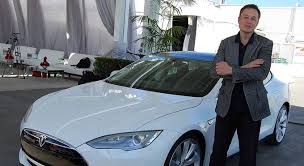
Is Musk’s Baby Boom a Sci-Fi Stunt? Given Musk’s penchant for ambitious, sometimes controversial ideas, one can’t help but wonder if his baby boom is part of a larger sci-fi fantasy or a calculated effort to prepare for the future. Musk’s fondness for science fiction is well known—his work with SpaceX and his ideas around AI, renewable energy, and space colonization often echo themes seen in sci-fi movies and books. His personal life, it seems, is no exception.
Critics have questioned whether Musk’s approach to parenting is a genuine effort to secure the future of humanity or simply a stunt that aligns with his larger-than-life persona. With 14 children from different relationships, the unusual number of offspring can certainly seem outlandish or eccentric. Is Musk truly concerned with overpopulation, or is he playing out a futuristic fantasy where his children are part of a new space-faring society?
Musk has frequently likened his plans for Mars colonization to the idea of space exploration in sci-fi narratives, and his approach to parenthood could be seen in a similar light. The thought of raising a large family in an era when many people are having fewer children may seem almost theatrical, like a plot line ripped straight from a sci-fi novel. Some might view his increasing brood as an extension of the vision Musk has for the world—a vision where technology, space travel, and even family are intertwined in a futuristic dream of survival and prosperity.
But whether seen as a stunt or a sincere endeavor, Musk’s growing family undeniably invites discussions about the ethics, practicality, and implications of having large families in today’s society, especially when technology and interplanetary exploration are part of the conversation.
A New Kind of Parenting: The Tech-Savvy Dad Elon Musk’s approach to parenting stands out from traditional norms. Known for his hands-on involvement in his businesses, Musk seems equally dedicated to shaping the future of his children’s lives. Despite his demanding schedule, Musk has spoken about how important it is for him to be actively involved in raising his kids, particularly when it comes to teaching them about technology, space exploration, and innovation. As a father, he’s raised eyebrows for his unorthodox methods, such as encouraging his kids to embrace STEM (Science, Technology, Engineering, and Mathematics) and thinking outside the box.
His parenting style reflects his vision for the future—a future where his children, who have grown up surrounded by cutting-edge technology, could help lead the way in making life on Mars a reality. Musk’s deep involvement in tech and engineering has likely influenced his children, who, no doubt, are exposed to his work on a daily basis. Whether or not they end up working in the same fields, it’s clear that Musk wants to ensure his children are prepared to thrive in a world shaped by technology and space exploration.
Musk has expressed that he encourages his children to develop independent thinking and problem-solving skills. His involvement in their education goes beyond traditional schooling—he’s known for offering his children a more hands-on approach, particularly with space exploration and technological innovations, teaching them the importance of challenging norms and pursuing big ideas.
Criticism and Controversy: Musk’s personal life, including his large family, has not been without criticism. Some have questioned whether such an unconventional approach to parenting is healthy or sustainable, particularly when it comes to raising children in a high-profile family with so much public attention. The frequent media coverage of Musk’s family dynamics, his high-profile relationships, and the constant public scrutiny have raised concerns about the impact of this on his children’s privacy and mental well-being.
Additionally, critics argue that while Musk’s vision for space exploration is groundbreaking, his personal decision to have a large family might be seen as a contradiction to his otherwise eco-conscious public persona. As an advocate for sustainability and environmental responsibility, Musk’s growing family may be seen as promoting population growth at a time when many argue for reducing consumption and resource use.
Nonetheless, Musk’s supporters point out that he is a visionary who is willing to think outside the box—whether that’s in the world of business or in his personal life. His large family, his approach to parenting, and his overall vision for humanity’s future all reflect his desire to push the boundaries of what’s possible and prepare the world for challenges and opportunities beyond Earth.
Conclusion: Elon Musk’s baby boom has sparked intense curiosity and debate. Is it a clever strategy to secure the future of humanity, or is it just another sci-fi-inspired stunt? Regardless of the answer, Musk’s growing family is undeniably a reflection of his larger-than-life ambitions and his vision for a future where technology, innovation, and space exploration play a central role. Whether Musk’s children become part of his interplanetary dream or lead lives independent of his legacy, his decision to expand his family underscores his commitment to ensuring that humanity continues to thrive, regardless of what challenges the future may hold. Ultimately, Musk’s baby boom may be as unconventional as his vision for the future, but in his world, thinking big—whether it’s about space or family—is just part of the plan.


